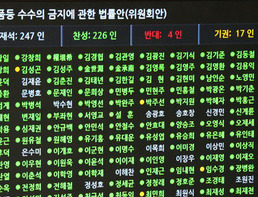 |
The results of lawmakers voting at the National Assembly in Seoul on Mar. 3 are posted on an overhead screen, with 226 in favor, four opposed and 17 abstaining. (by Lee Jeong-woo, staff photographer)
|
Saturday, March 7, 2015
The Kim Young-ran act must not be defanged with dubious exemptions
Subscribe to:
Post Comments (Atom)




No comments:
Post a Comment